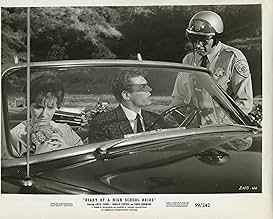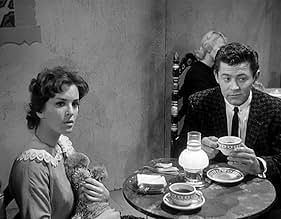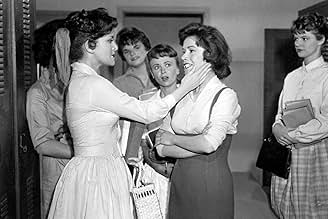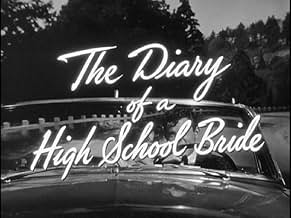अपनी भाषा में प्लॉट जोड़ेंA 17-year-old high-school senior must justify her wedding to a 24-year-old law student to both her parents and her unbalanced ex-boyfriend.A 17-year-old high-school senior must justify her wedding to a 24-year-old law student to both her parents and her unbalanced ex-boyfriend.A 17-year-old high-school senior must justify her wedding to a 24-year-old law student to both her parents and her unbalanced ex-boyfriend.
Ron Foster
- Steve
- (as Ronald Foster)
Frank Biro
- Mr. Lewis
- (as Barney Biro)
Dick Gering
- Richie
- (as Richard Gering)
Elvera Corona
- Dancer
- (as Elvira Corona)
Allan Lurie
- Tony
- (as Al Laurie)
फ़ीचर्ड समीक्षाएं
Sure there are things that could be stronger, and Steve seems a little bit too old and smart to have picked at 17 y.o. high school student of questionable achievement for a wife (although I guess that in itself should give question to his intelligence), but the film does really capture some of the difficulties of new marriage, and there are a couple of decent songs. There are some sensible people in the story, too, especially viewed through a 1950s lens, but I wish there had been more realistic high school girls, both sugary ones and snotty ones, dealing with Judy's changed status. There's also some pretty good tension due to the constant harassment from the skeevy ex-boyfriend Chuck, which was a bit of a surprise. Anyway, while I didn't find it the most entertaining thing in the world, it was an okay piece of film making. It's hard to understand how Chuck's girlfriend puts up with him, though; I would totally dump his trouble-making ass.
Although the makers of "The Diary of a High School Bride" make the film seem like an exploitation film about young brides when it begins, the film is far less than you might expect. Plus, back in 1959, folks getting married at 17 wasn't all that unusual.
The film begins with Steve and Judy having just eloped. She is only 17 and so technically the marriage isn't legal. However, when Judy's parents hear about it, her father (with some objections from the mother) decides that the best thing to do is just accept it. Plus, he figures his daughter will soon come to her senses. However, the big problem with the marriage comes from some punks at Judy's high school (she is a Senior). They think it's funny to harass them and some of their 'pranks' get amazingly dangerous. However, Chuck's actions soon intensify, as he decides he's going to have sex with Judy whether she's willing or not! So, instead of a drama about teen marriages, it's more a film about rape. And, as such, it's actually not bad and responsibly done. Worth a look.
By the way, if you are interested, Judy (Anita Sands) was about 18-19 when she made the film and Steve (Ron Foster) was 28-29. To me, this huge age gap was a lot creepier than having Sands play a 17 year-old.
The film begins with Steve and Judy having just eloped. She is only 17 and so technically the marriage isn't legal. However, when Judy's parents hear about it, her father (with some objections from the mother) decides that the best thing to do is just accept it. Plus, he figures his daughter will soon come to her senses. However, the big problem with the marriage comes from some punks at Judy's high school (she is a Senior). They think it's funny to harass them and some of their 'pranks' get amazingly dangerous. However, Chuck's actions soon intensify, as he decides he's going to have sex with Judy whether she's willing or not! So, instead of a drama about teen marriages, it's more a film about rape. And, as such, it's actually not bad and responsibly done. Worth a look.
By the way, if you are interested, Judy (Anita Sands) was about 18-19 when she made the film and Steve (Ron Foster) was 28-29. To me, this huge age gap was a lot creepier than having Sands play a 17 year-old.
Though made for a drive-in audience the movie's not typical of that often tacky fare. A few notes on historical context may help understanding aspects of the film.
Before the big Baby-Boomer Generation, there was the so-called Silent Generation. For obvious reasons, few now have heard of it. For kids coming of age, the period was from about 1950-65, and was called silent because the main ambition of the youngsters was to get married and get a job which were plentiful in that post-WWII era. The popular refrain of the time was "Are we too young to get married". In short, there was little gap between youth and adulthood. One motivating reason was that sex outside of marriage was strictly forbidden. Thus hormonally driven youth were sometimes thrust into early, unhappy marriages. This movie from that era (1959) dramatizes some of the prevailing aspects.
All in all, the movie's best at showing the strains on Steve's and 17-year old Judy's troubled early marriage, especially when she's required to do household drudgery—good touch. In short, being a housewife has a non-romantic downside. Her parents are disapproving of the youthful arrangement as would be expected. But their conniving is fairly subtle. Unfortunately, the movie was produced mainly for teen audiences, so the contrived role of hoodlum Chuck hassling the newly-weds takes up more time than it should, and represents a strictly commercial side. Nonetheless, moments of unexpected quality do pop up, especially in Sands' (Judy) performance dour though it often is. Also, the final shot is more ambiguous than I expected from this type movie. And catch that bang-up look at the intricacies of a movie studio serving as an action climax. For folks interested in modern mores, the film presents some insights, along with a fairly entertaining narrative..
(In passing—Note the semi-Beatnik coffee shop the kids gather at. I say "semi" since something more genuine would have featured jazz, bongo drums, and poetry readings. Whatever the case, the Beatnik fad was short- lived, professing to be a non-conformist movement among the conformist Eisenhower era.)
Before the big Baby-Boomer Generation, there was the so-called Silent Generation. For obvious reasons, few now have heard of it. For kids coming of age, the period was from about 1950-65, and was called silent because the main ambition of the youngsters was to get married and get a job which were plentiful in that post-WWII era. The popular refrain of the time was "Are we too young to get married". In short, there was little gap between youth and adulthood. One motivating reason was that sex outside of marriage was strictly forbidden. Thus hormonally driven youth were sometimes thrust into early, unhappy marriages. This movie from that era (1959) dramatizes some of the prevailing aspects.
All in all, the movie's best at showing the strains on Steve's and 17-year old Judy's troubled early marriage, especially when she's required to do household drudgery—good touch. In short, being a housewife has a non-romantic downside. Her parents are disapproving of the youthful arrangement as would be expected. But their conniving is fairly subtle. Unfortunately, the movie was produced mainly for teen audiences, so the contrived role of hoodlum Chuck hassling the newly-weds takes up more time than it should, and represents a strictly commercial side. Nonetheless, moments of unexpected quality do pop up, especially in Sands' (Judy) performance dour though it often is. Also, the final shot is more ambiguous than I expected from this type movie. And catch that bang-up look at the intricacies of a movie studio serving as an action climax. For folks interested in modern mores, the film presents some insights, along with a fairly entertaining narrative..
(In passing—Note the semi-Beatnik coffee shop the kids gather at. I say "semi" since something more genuine would have featured jazz, bongo drums, and poetry readings. Whatever the case, the Beatnik fad was short- lived, professing to be a non-conformist movement among the conformist Eisenhower era.)
Cute as a button Anita Sands dumps high school beau Chris Robinson to marry law school student Ron Foster. Robinson doesn't take it well. Neither do her parents.
It's not a bad second feature from AIP, which seems to have some opinion that it's not the best idea for boys and girls to drop out of school to get married. Even if it works out, it requires work and maturity, which none of these crazy kids have got. I can't tell whether it's the actors, the script, or directors, but everyone seems a bit shallow and flat here; that may be my age talking. Surely the kids who necked to this in theaters didn't care.
It's not a bad second feature from AIP, which seems to have some opinion that it's not the best idea for boys and girls to drop out of school to get married. Even if it works out, it requires work and maturity, which none of these crazy kids have got. I can't tell whether it's the actors, the script, or directors, but everyone seems a bit shallow and flat here; that may be my age talking. Surely the kids who necked to this in theaters didn't care.
The lesson here seems to be that if you are a 17-year-old high school senior who marries a 24-year-old, your parents will be ticked off, your friends will diss you, your ex-boyfriend will get turned on, and your acting career will end up in the toilet. Who saw any of this coming?
Judy (Anita Sands) carries a stuffed animal with her, even on her wedding night. Maybe there is something Freudian in that; I wouldn't know. Her new hubby Steve (Ronald Foster) lives in a one-bedroom apartment, but is a law student, so maybe Judy hopes that someday he will become rich and unprincipled. Chris Robinson, as her borderline psycho ex, is not very menacing, and can be taken out with a few punches. There are several scenes in a teen hangout, a dive which seems to be a combination of fast-food diner, beatnik café, Spanish guitar and dancer mishmash. One of the patrons does something weird with his cheeks, but I didn't rewind to study it more carefully.
Tony Casanova, who apparently had a singing career for a few days (you'll see why if you watch this), performs the title tune, and also another ditty in the hangout. The ending has a modicum of suspense, but by then I doubt if you'll be paying attention. The only bit of interest is a passing reference to "The Screaming Skull," which was far better than this opus - and which is also not saying much. At least that film featured a nice performance by Peggy Webber's upper body.
Judy (Anita Sands) carries a stuffed animal with her, even on her wedding night. Maybe there is something Freudian in that; I wouldn't know. Her new hubby Steve (Ronald Foster) lives in a one-bedroom apartment, but is a law student, so maybe Judy hopes that someday he will become rich and unprincipled. Chris Robinson, as her borderline psycho ex, is not very menacing, and can be taken out with a few punches. There are several scenes in a teen hangout, a dive which seems to be a combination of fast-food diner, beatnik café, Spanish guitar and dancer mishmash. One of the patrons does something weird with his cheeks, but I didn't rewind to study it more carefully.
Tony Casanova, who apparently had a singing career for a few days (you'll see why if you watch this), performs the title tune, and also another ditty in the hangout. The ending has a modicum of suspense, but by then I doubt if you'll be paying attention. The only bit of interest is a passing reference to "The Screaming Skull," which was far better than this opus - and which is also not saying much. At least that film featured a nice performance by Peggy Webber's upper body.
क्या आपको पता है
- ट्रिवियाIn January 1960, this film was widely shown in drive-in theaters on a double bill with Ghost of Dragstrip Hollow (1959), also from Alta Vista Productions.
- गूफ़Steve and Judy's route home from Las Vegas makes no sense. After they are stopped for speeding, they are shown taking the Balboa ferry--away from the peninsula--in Newport Beach, which is south of Los Angeles. Then they are shown on a freeway in downtown Los Angeles--note the iconic City Hall building in the background.
- कनेक्शनReferences Hell Squad (1958)
- साउंडट्रैकDiary of a High School Bride
Performed and written by Tony Casanova
टॉप पसंद
रेटिंग देने के लिए साइन-इन करें और वैयक्तिकृत सुझावों के लिए वॉचलिस्ट करें
विवरण
- रिलीज़ की तारीख़
- कंट्री ऑफ़ ओरिजिन
- भाषा
- फ़िल्माने की जगहें
- Fern Dell, Griffith Park - 4730 Crystal Springs Drive, लॉस एंजेल्स, कैलिफोर्निया, संयुक्त राज्य अमेरिका(Judy and Steve go for a walk in a park with footbridges and a small waterfall)
- उत्पादन कंपनी
- IMDbPro पर और कंपनी क्रेडिट देखें
बॉक्स ऑफ़िस
- बजट
- $80,000(अनुमानित)
- चलने की अवधि1 घंटा 12 मिनट
- रंग
- ध्वनि मिश्रण
- पक्ष अनुपात
- 1.37 : 1
इस पेज में योगदान दें
किसी बदलाव का सुझाव दें या अनुपलब्ध कॉन्टेंट जोड़ें

टॉप गैप
By what name was The Diary of a High School Bride (1959) officially released in Canada in English?
जवाब
























